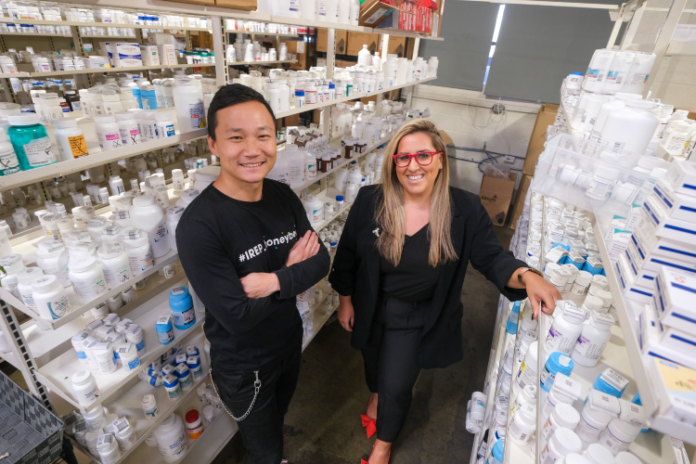From a mere $27,000 in sales in 2018, Honeybee Health’s revenue zoomed to $5 million in 2020 for a three-year growth rate of 19,159%, the largest three-year growth rate by far of any company on the Business Journal’s annual Fastest Growing Private Companies list.
And Honeybee Health’s rapid growth is continuing into 2021: According to co-founder and Chief Executive Jessica Nouhavandi, revenue this year is on track to reach $14 million, almost triple the revenue from last year.
Nouhavandi said in an interview with the Business Journal that Honeybee Health achieved this remarkable growth rate by focusing on lower-cost generic medications, targeting patients who don’t have medical insurance and by being an actual pharmacy capable of filling prescriptions.
“We started Honeybee three years ago as an online pharmacy for generic medication without the need for insurance,” Nouhavandi said. “We only buy pharmaceuticals from (Food and Drug Administration)-approved wholesalers. That’s why we’re able to offer a prescription for up to 80% less than what a traditional pharmacy would charge.”
Nouhavandi said she and co-founder Peter Wang came up with the idea for Honeybee Health as they were operating an independent pharmacy in Moorpark in Ventura County.
“We quickly realized that there were huge disparities between what people were paying for the same medication, depending on their insurance,” she said. “There was no real source for what the actual cost should be. Ultimately, we felt bad about what was happening.”
The pair was also inspired by the success of Santa Monica-based GoodRx Holdings Inc., which pioneered the concept of shopping around for the best price on a prescription.
Nouhavandi and Wang sold their independent pharmacy in 2017 and used most of the proceeds — between $500,000 and $1 million — to launch their online pharmacy venture.
The pair focused on generic medications because that gave them — and their patient customers — more options in choosing the best manufacturer. Nouhavandi noted that even when several generic drug manufacturers produce the same medication, there are always slight differences, such as the choice of fillers, additives or dyes.
They also decided to focus mostly on uninsured patients, as they stand to benefit the most with sharply discounted drugs. Honeybee’s timing on this was key as millions of people nationwide suddenly lost their jobs — and their employer-sponsored health insurance — when the pandemic hit in spring 2020.
But Honeybee Health has been moving into a very crowded market, according to Geoffrey Joyce, director of health policy at the USC Schaeffer Center for Health Policy and Economics. He said GoodRx was among the first to offer consumers lower prices on (mostly) generic prescriptions and that many others have followed, including Seattle-based Amazon.com Inc.
But unlike most other online pharmacy operations, which typically act as middlemen matching patients to pharmacies that have the best deals, Nouhavandi and Wang wanted to operate their own pharmacy online. That meant having to get licensed to operate as pharmacists in every state they wanted to do business in, which delayed the launch by about a year.
Today, Honeybee Health operates in 47 states and U.S. territories.
Nouhavandi said that this year, the focus has been on getting Honeybee Health integrated into physicians’ electronic medical records systems.
“A lot of times, the point at which we come in is when the patient tells the doctor they stopped taking their medications because they are too expensive,” Nouhavandi said.
Joyce said Honeybee will face a major challenge as it attempts to maintain its growth.
“It will likely be difficult for them to scale up because there are so many other larger players in this market,” he said.

